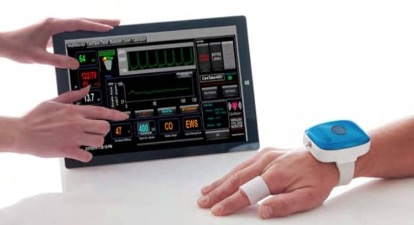Noninvasive Technology Detects Rare Cancer Cells in Blood
June 12, 2024
Source: drugdu
 434
434
 Historically, analyzing circulating tumor cells (CTCs) required invasive methods like blood draws, which often missed rare CTCs or multicellular CTC clusters (CTCCs) known for their high metastatic potential. Now, a groundbreaking technology offers a new way for researchers to monitor and understand the spread of cancer within the body.
Historically, analyzing circulating tumor cells (CTCs) required invasive methods like blood draws, which often missed rare CTCs or multicellular CTC clusters (CTCCs) known for their high metastatic potential. Now, a groundbreaking technology offers a new way for researchers to monitor and understand the spread of cancer within the body.
A collaborative effort between researchers at Northeastern University (Boston, MA, USA) and Dartmouth College (Hanover, NH, USA) has led to the development of an innovative device known as "diffuse in vivo flow cytometry" (DiFC). This technology facilitates the noninvasive detection and counting of rare cancer cells circulating in the bloodstream. By utilizing highly scattered light to probe large blood vessels, DiFC overcomes the shortcomings of traditional tests to enable the noninvasive analysis of larger peripheral blood volumes and detection of rare cancer cells. The team’s pioneering two-color DiFC system can simultaneously identify two distinct populations of cancer cell in real time within small animals, paving the way for deeper insights into cancer evolution and treatment responses by studying various cancer cell subpopulations in the same subject.
The versatility of this two-color DiFC system was demonstrated through experiments on tissue-mimicking flow phantoms and mice afflicted with multiple myeloma. By effectively distinguishing cancer cells marked by green fluorescent protein (GFP) and tdTomato, it was possible to observe the dynamics of cancer spread in real time. Notably, most detected CTCCs exhibited single fluorescent proteins, shedding light on the heterogeneity of cancer cell populations. The implications of this technology are significant as it offers the potential to simultaneously track various subpopulations of cancer cells, providing critical insights into tumor growth and therapeutic responses. This paves the way for more refined and individualized treatment options, moving closer to effectively managing cancer. While the battle against cancer is complex, advancements like DiFC provide the tools essential for meeting this challenge. As this technology evolves, it promises to lead to more effective cancer therapies and a future where cancer may no longer be a life-threatening condition.
Source:
https://www.labmedica.com/pathology/articles/294801474/noninvasive-technology-detects-rare-cancer-cells-in-blood.html
Read more on
- China Sino Biopharmaceutical Signs Exclusive Licensing Agreement with Sanofi for Rofalcitinib March 4, 2026
- Gan & Lee Pharmaceuticals’ new PROTAC drug GLR2037 tablets have been approved for clinical trials to enter the field of prostate cancer treatment March 3, 2026
- AideaPharmaceuticals plans to raise no more than 1.277 billion yuan through a private placement to focus on the global clinical development of innovative HIV drugs March 3, 2026
- Giant Exits! Its Star Business Acquired March 3, 2026
- Focusing on cardiovascular and cerebrovascular diseases! OpenMediLead Medical Intelligence Dual Engines Launch Internal Testing, Connecting Drug Development and Clinical Diagnosis in a Closed Loop March 3, 2026
your submission has already been received.
OK
Subscribe
Please enter a valid Email address!
Submit
The most relevant industry news & insight will be sent to you every two weeks.



